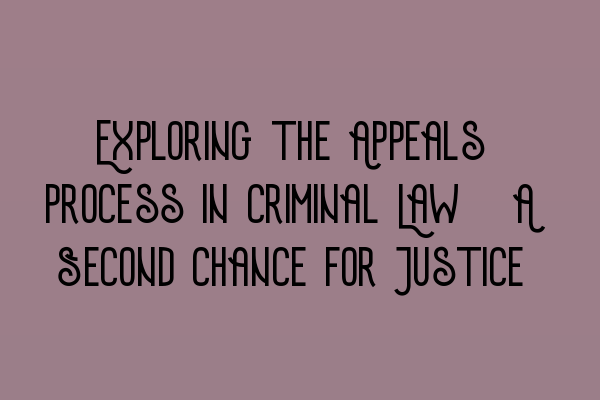Exploring the Appeals Process in Criminal Law: A Second Chance for Justice
When it comes to criminal law, the appeals process plays a crucial role in ensuring justice is served. An appeal offers individuals the opportunity to challenge a verdict or sentence handed down by a court, providing a second chance to correct any errors or injustices that may have occurred during the initial trial. In this article, we will explore the appeals process in criminal law and shed light on how it serves as a crucial part of our justice system.
The Importance of the Appeals Process
The appeals process serves as a safeguard against miscarriages of justice and errors made during the initial trial. It allows parties dissatisfied with the outcome to request a review by a higher court, ensuring that the legal system operates fairly and transparently. By providing an avenue for individuals to challenge decisions, the appeals process upholds the principles of justice and accountability.
The Appeals Process in Criminal Law
The appeals process typically begins with filing a notice of appeal within a specified timeframe after the original verdict or sentencing. This notice highlights the grounds on which the appeal is being sought. The appellant, often represented by a solicitor or barrister, then files an appeal brief which outlines the legal arguments against the original decision and presents supporting evidence.
Once the appeal brief is filed, the respondent who represents the opposing party may file a response brief. This allows them to counter the arguments made by the appellant and advocate for upholding the original decision. The court then reviews all submissions made by both parties, along with the transcripts and evidence from the original trial.
During the appeal process, oral arguments may be presented before the court, allowing the parties to further clarify their positions and address any questions raised by the judges. After careful consideration, the court will either uphold the original decision, modify it, reverse it, or order a retrial.
The Grounds for Appeal
There are various grounds on which an appeal can be sought in criminal law. These may include:
- Error in law: If it can be demonstrated that a mistake occurred in the application or interpretation of the law during the trial, an appeal can be filed.
- Procedural irregularities: Any errors or breaches of legal procedures that may have affected the outcome can be raised as grounds for an appeal.
- New evidence: If new evidence emerges that was not available during the original trial and may have had a material impact on the verdict, an appeal can be sought.
- Misdirection of the jury: If it can be shown that the judge misdirected the jury or provided incorrect instructions, an appeal can be made.
- Unreasonable or excessive sentence: Appeals can also be filed based on the argument that the sentence imposed was unjustly harsh or unreasonable in light of the circumstances.
Conclusion
The appeals process in criminal law offers individuals a second chance for justice. It ensures that errors, irregularities, or miscarriages of justice can be rectified, and provides an avenue for parties dissatisfied with the outcome of a trial to seek a fair review from a higher court. By understanding the appeals process and its grounds, individuals can make informed decisions regarding their legal options.
If you are preparing for a career in criminal law or studying for the SQE exams, check out our related articles:
- Take a look at our SQE 1 Practice Exam Questions article to enhance your knowledge and test your understanding.
- Looking for mock exams to practice for the SQE 1 exam? Our article on SQE 1 Practice Mocks FLK1 FLK2 will help you improve your exam readiness.
- If you are preparing for the SQE 2 exams, our comprehensive SQE 2 Preparation Courses will provide you with the necessary resources and guidance.
- For aspiring solicitors looking for comprehensive SQE 1 preparation, take a look at our SQE 1 Preparation Courses article.
- Stay updated with the latest SRA SQE exam dates by visiting our article on SRA SQE Exam Dates.
